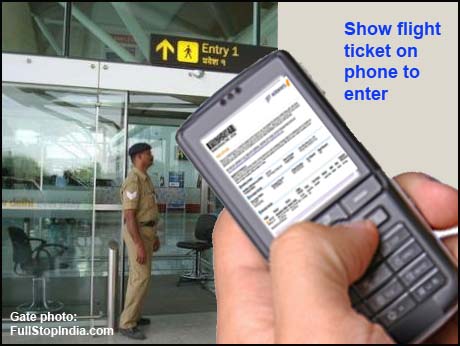
Major irritant removed -- and airlines will stop fleecing passengers and charging for providing printoutsNew Delhi January 2 2013: 2013 began with good news for airline passengers travelling through Indian airports. You no longer need to show a printout of your ticket to enter the airport – an image of the ticket on phone, tablet or laptop will do.
A release by the Indian government’s Bureau of Civil Aviation Security says:“Now passengers are allowed on the basis of soft copy/image of e-tickets in smart phones, tablet PCs or laptops for gaining access into the terminal building. The image of the e-ticket produced by the passenger on electronic device should be the same as (that) issued by the aircraft operators. SMS or partial information pertaining to the ticket shall not entitle the passenger to gain access to Terminal. Passengers concerned shall produce a valid photo identity document (passport in case of foreign nationals) before being allowed to enter the Terminal Building….”
This removes a major hassle for passengers ever since airlines facilitated passengers to book and pay for tickets on the Internet, even from mobile phones. This was great for last minute travel decisions, often en route to the airport. The PNR number received by SMS on one’s phone, with an ID proof was sufficient to check in
But airlines have been exploiting government’s insistence on a printed ticket to enter the airport in the first place – and almost without exception they have been fleecing passengers for nearly a year now, by charging Rs 50 to provide a printout at the ticketing counters located outside the terminal buildings. The humbug of their paperless ‘green’ ticketing protestations, has thus been irking passengers – till the new facilitation that kicks in from January 1.
Ironically the Indian Railways went down this route much earlier – but then they are run by government, not by private players, always looking for ways to make a quick buck.